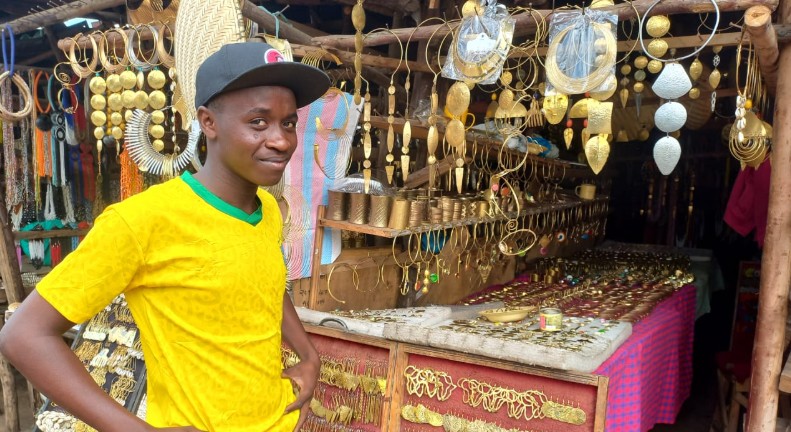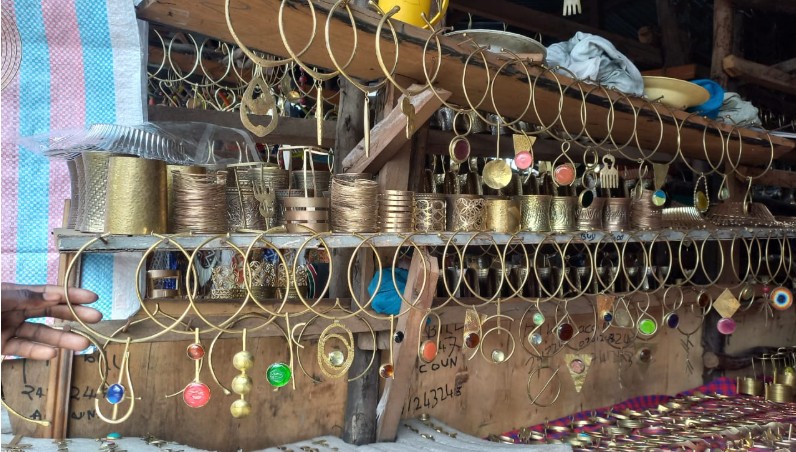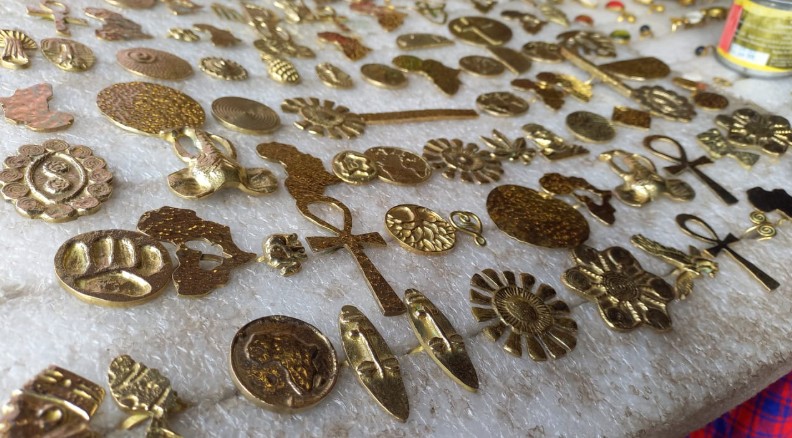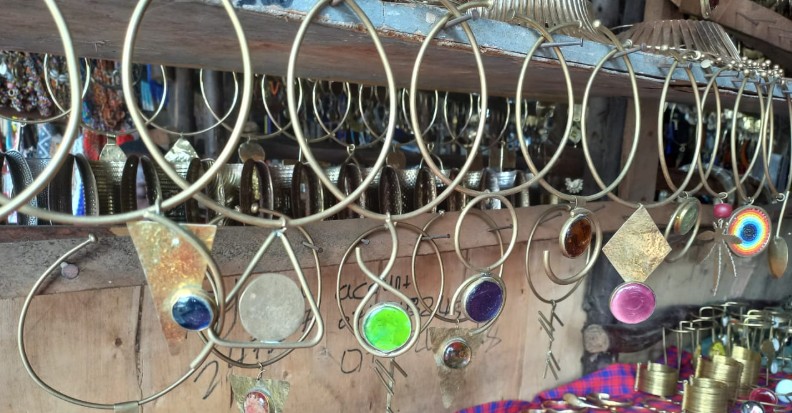Forging the future: How Kelvin Kimuyu is reviving brass craft in Nairobi’s Kariokor Market

Kimuyu begins his craft by sourcing brass from trusted local vendors in Nairobi, often selecting clean sheets or rods of the metal that are free from impurities.
In the bustling heart of Nairobi’s Kariokor Market, I met 21-year-old Kelvin Kimuyu quietly but powerfully redefining what it means to be a modern artisan.
He could be scrolling through TikTok or Instagram, recording trending sounds and showing off his dance moves like many in his Gen Z cohort, but instead, Kimuyu spends his days refining the centuries-old craft of brass jewellery, blending tradition with trend, and turning metal into meaning.
From a modest, hand-built wooden stall perched along the busy road leading to the Nairobi bus station, popularly known as Machakos Bus Station, just after the Gikomba junction, Kimuyu welcomes customers with a warm, cheerful demeanour.
Amid the rattle of tools from nearby artisans, the buzz of traders and customers and the constant honking of matatus and cars squeezing past, he proudly displays his brass creations.
Though the actual crafting happens off-site, this stall is his stage; a vibrant corner where he engages with clients, shares the stories behind each piece, and helps customers choose jewellery that speaks to them.
He designs rings, necklaces, bangles and earrings, blending tradition with a modern touch, each telling a story of cultural pride and artistic innovation.
When I met Kimuyu on a Thursday morning, he had already been at work since dawn.
 Kimuyu’s workshop is a sanctuary of passion and legacy, shaped by the influence of his mother, Joy Mutindi, a fellow artisan and trader and his greatest mentor. (Photo: Margaret Wanjiru)
Kimuyu’s workshop is a sanctuary of passion and legacy, shaped by the influence of his mother, Joy Mutindi, a fellow artisan and trader and his greatest mentor. (Photo: Margaret Wanjiru)
More than just a workplace
His kiosk, just a meter and a half wide, is more than just a workplace.
It is a sanctuary of passion and legacy, shaped by the influence of his mother, Joy Mutindi, a fellow artisan and trader and his greatest mentor.
Before we even exchanged words, I noticed her, quiet, patient, and composed.
Mutindi, Kimuyu’s mother, sat a few meters away in her own stall, watching her son handle clients with a mix of pride and calm detachment. She did not hover or interrupt like you would expect from most of our parents.
Instead, she allowed him to shine, stepping back with the kind of confidence that comes from years of doing it herself.
Joy occupies her own space in the market, but her presence resonates in Kimuyu’s work.
Kimuyu picked up the tools of the trade at just 18, drawn to the craft that had always been part of his world. What began as a mere experiment soon blossomed into something far deeper, a passion that would define his journey.
"Watching my ideas come to life, seeing the raw material transform into something beautiful, something meaningful, that’s something I’m really proud of," he says with a glimmer of pride in his eyes.
"Every piece is a reflection of me, my thoughts, my culture. It’s not just about making jewellery; it’s about telling a story."
 Kimuyu designs rings, necklaces, bangles, and earrings that blend tradition with modern style, each piece reflecting cultural pride and creativity. (Photo: Margaret Wanjiru)
Kimuyu designs rings, necklaces, bangles, and earrings that blend tradition with modern style, each piece reflecting cultural pride and creativity. (Photo: Margaret Wanjiru)
Spark a new idea
He often sketches his designs beforehand, drawing inspiration from both online trends and spontaneous moments during his day. Sometimes, a single glance at something while walking is enough to spark a new idea.
Though he creates his pieces at home due to limited space at the stall, his process is hands-on and deliberate.
He sources his brass locally and uses traditional crafting tools to bend, cut, solder and polish each item.
Kimuyu begins his craft by sourcing brass from trusted local vendors in Nairobi, often selecting clean sheets or rods of the metal that are free from impurities.
Once he brings the material home, he sketches his designs either by hand or directly onto the brass surface or even uses previously designed sketches before carefully cutting them out using jeweller’s saws or metal snips.
He tells me that sometimes, he can just do a piece off from his mind.
Soften the brass
The cut pieces are then heated over a small flame to soften the brass, a process known as annealing, which allows him to shape them with greater ease.
Using a set of well-worn hand tools like hammers, pliers, mandrels, and anvils, Kimuyu carefully forms each piece into its intended shape, whether it is a bold cuff bracelet, a pair of delicate earrings, or a custom wedding band.
Once the shaping is done, he files and sands the edges to remove any sharp bits or imperfections, before buffing the surface to bring out the metal’s warm, golden sheen.
For polishing, Kimuyu prefers both traditional and natural methods.
He tells his customers that while brass can last for years, decades even, with proper care, it does require occasional cleaning.
His advice? Use simple household ingredients: a mixture of lemon juice and bicarbonate of soda or vinegar and a pinch of salt.
Rub gently with a soft cloth or fine steel wool, then rinse with water and dry thoroughly. This natural polish brings back the shine without damaging the surface or altering the integrity of the piece.
“You don’t need fancy sprays; just lemon and baking soda, and your jewellery will glow like new,” he often tells buyers with a smile.
The results are striking, bold yet elegant, practical yet unique.
Unlike mass-produced jewellery from Dubois Road or imports from China, Kimuyu’s work stands out for its durability and originality.
"You won’t find two people wearing the same piece from my stall," he says with quiet confidence.
Built to last
The jewellery Kimuyu creates is not just accessories, they are built to last, often outliving fast fashion trends and retaining its charm for decades.
“Long before mass-produced innovations and imported Chinese designs flooded the market, Africans, especially Kenyans, proudly embraced brass,” the mother told me.
“It was a material of significance, used not just for its durability and affordability but for its cultural symbolism. In many communities, brass adorned elders, warriors, brides, and dancers, telling stories of status, identity, and celebration.”
Kimuyu’s work honours that legacy, reimagining it for the modern era while preserving the traditional respect for the metal.
“Brass is not new to us. Our people have worked with it for generations. I just give it a new voice,” he says.
His clientele is as diverse as his designs. From walk-in customers seeking everyday pieces to brides requesting custom wedding jewellery, Kimuyu caters to men and women alike.
“A lot of my customers come saying, ‘This is for my girlfriend,’ or, ‘I need something unique for my mum’s birthday,’” he says.
“Others just want to spoil themselves, and they should.”
His pieces serve not only as personal accessories but also as thoughtful gifts for loved ones.
 Kimuyu often sketches his designs beforehand, drawing inspiration from both online trends and spontaneous moments during his day. (Photo: Margaret Wanjiru)
Kimuyu often sketches his designs beforehand, drawing inspiration from both online trends and spontaneous moments during his day. (Photo: Margaret Wanjiru)
Authenticity
Foreign tourists, too, are regulars at his stall, drawn to the authenticity and artistry of his work.
"They like that it’s handmade, that there’s a story behind every piece. Some come back the next year or send friends."
Kimuyu has served everyone from casual shoppers to high-profile clients arriving in sleek, high-end vehicles.
"But I treat everyone the same. If you’re here, you are family," he says.
Despite his talent, the journey has not been without its challenges.
The pungent smell of urine occasionally lingers around his stall, a result of street children sleeping on the market benches at night. It is an uncomfortable reality, but one he has learned to live with.
There is also the daily county levy of Sh50, collected by Nairobi City County officers, even on days when no sales are made.
"Sometimes I go home without a shilling; but I showed up, and that counts."
Another major hurdle is the rising cost of materials. With Kenya’s economic situation pushing prices higher, Kimuyu has had to adjust his pricing. However, he remains committed to quality, refusing to compromise even when it eats into his margins.
Online business
To keep up with changing times and expand his reach, Kimuyu has taken his business online.
He uses WhatsApp broadcast lists, TikTok, and social media live sessions to promote his jewellery, strategies that his mother is still learning.
"The market has changed. You can’t just wait for people to walk in, you have to go where they are," he says.
The sense of camaraderie among Kariokor’s traders is also something Kimuyu deeply values.
"We support each other. If I don’t have a tool or material, someone next door will lend it. We look out for each other."
Kimuyu comes from a family deeply rooted in the brass trade.
He has three brothers, each slowly finding their way into the craft. As I was preparing to leave, one of them, quiet but clearly passionate, joined us at the stall, eager to show off a brass piece he had been working on at home.
Next generation of artisans
It was a small, touching moment, a quiet sign that the next generation of artisans is already rising within the family.
Ultimately, Kimuyu dreams of opening a fully equipped shop, one that is not just a display stall, but a spacious, well-organised outlet where he can serve both walk-in clients and manage large wholesale orders, while also having a dedicated space to work and refine his designs.
His ambition extends beyond Kariokor; he envisions attracting international clients, collaborating with fashion designers both locally and across borders, and showcasing Kenyan craftsmanship on the global stage.
In an era where mass production often overshadows the soul of handmade work, Kelvin Kimuyu stands out as a beacon of skill, resilience, and entrepreneurial spirit.
His story is not just about jewellery, it is about preserving heritage, honouring family, and building a legacy that gleams with promise.
Kimuyu’s brass creations range from as little as Sh200 to higher bespoke prices, depending on design and intricacy. You can catch a glimpse of his pwork on TikTok at @kevo.
Top Stories Today










































